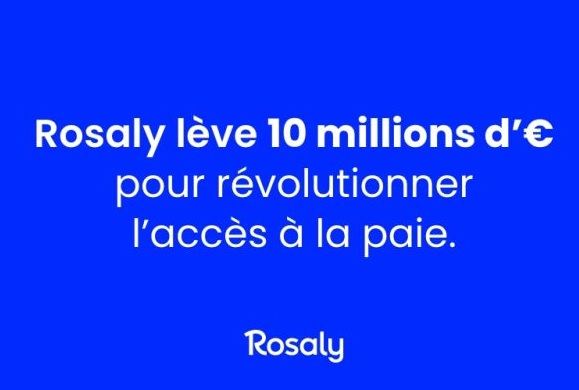Rosaly raises funds to facilitate salary advance

Rosaly is a young FinTech specialising in the field of advance payments. It has just completed a major fundraising that should enable it to establish itself on this rapidly expanding market. Its objective is clear: beyond France, the FinTech intends to become a European reference.
FACTS
-
Founded in 2019, Rosaly has just announced that it has raised nearly €10 million from Fin Capital (a US fund specialising in FinTech) and also from The Treasury VC, FJ Labs, Auxxo, LeFonds VC, Clocktower, Kraken Ventures, Audeo Ventures, Sie Ventures and Moving Capital.
-
Its new funding, which is in addition to the 1.5 million already raised by the FinTech in 2021, will enable it to further develop its payroll advance and automated down payment management offering for businesses.
-
Rosaly currently has more than 150 client companies, of all sizes and in all sectors, which are now using its practical advance management system integrated with payroll software. The system is based on a customised interface. An initial parameterisation enables the management of employee requests in an automatic manner. Payroll managers can view their employees' requests in real time and access the history of these requests.
-
On the employee side, a free mobile application is available on iOS and Android to allow them to view their available salary in real time and make requests for advance payments in one click.
-
In the back office, Rosaly advances salary deposits for its client companies. The latter reimburse it at the end of the month, in exchange for a fixed monthly subscription per employee.
-
Rosaly is certified as a socially responsible FinTech by organisations such as Afnor, Finance Innovation or Tech for good France and benefits from the B Corp certification dedicated to companies meeting social and environmental requirements.
CHALLENGES
-
Limiting cash flow difficulties: The current economic situation is particularly advantageous for the development of an offer such as Rosaly's. Current events are largely marked by the rise in raw material prices, inflation and the explosion in energy costs. Rosaly thus represents a palliative solution to improve the finances of the French in a difficult context.
-
Valuing benevolence in companies: Another strong trend, linked to the Covid crisis, is the growing demand from employees for well-being in the workplace and, ultimately, for employee benefits. Rosaly works on the basis of partnerships with companies to offer its services to end customers: employees. And the FinTech presents its service as a tool to reduce absenteeism, turnover, and a way to improve the image of companies.
-
Expanding internationally: After signing partnerships with major players in the employee benefits market (Sodexo, Groupe Up, and the BPCE Group subsidiary Bimpli), Rosaly also plans to open its offer to other European countries by the end of 2024. To do this, it will recruit around a hundred additional employees.
-
Becoming a financial super-app: The deployment of salary advances is a first step for Arbia Smiti, founder of Rosaly. She says she wants to transform her offer into a financial super-app combining, in the long term, a bank account with a card, cashback, savings products and already a layer of financial education and an initial overdraft alert solution.
MARKET PERSPECTIVE
-
55% of French people cannot afford an unexpected expense of more than 500 euros. 7 billion in agios are paid each year by the French. Faced with these figures, which Rosaly highlights to underline the relevance of its service, the FinTech also contrasts one of its findings: a third of French people would like to be paid in several instalments each month.
-
One of the major current trends is to improve the flexibility of cash management. Responding to strong expectations on this theme, many new services are emerging to facilitate spending (like the BNPL boom) and remuneration.
-
Rosaly has managed to raise funds to ensure the deployment of a solution that is resolutely in tune with the times. It will nevertheless have to confront new offers that are emerging, such as the recent Manager.One. For if this market is dense in the United States and the United Kingdom, it is now also growing in France.
